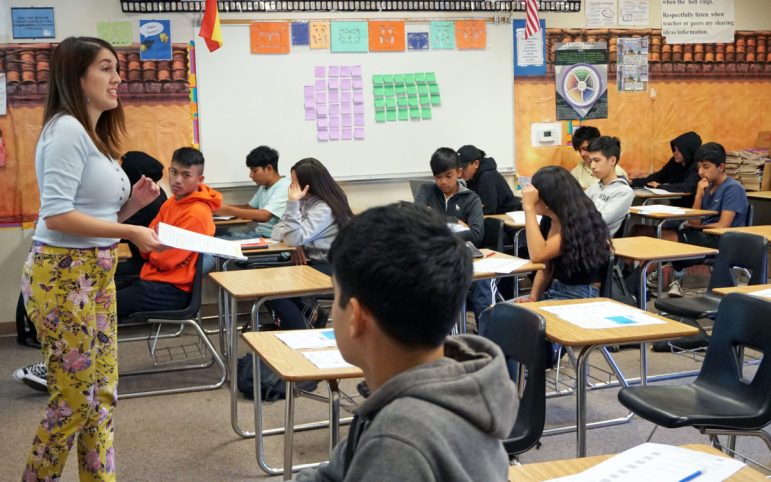Juan Garcia was proud to walk across a stage this spring at Venture Academy in Stockton to receive a medal for the state seal of biliteracy, proof that he can speak, read and write in English and Spanish.
“It’s a great achievement to have. It opens up so many great opportunities. Just having that extra language opens up a whole other world of people,” Garcia said.
Yet many students, particularly English learners, don’t receive the state seal of biliteracy, even though they are bilingual, because there aren’t enough options to show students are proficient in English, according to some advocates and district and county officials. A bill currently in the Legislature, Assembly Bill 370, aims to change that.
The State Seal of Biliteracy was adopted by California in 2012. High school graduates can receive the gold seal on their high school diploma or transcript if they demonstrate proficiency in English and another language.
In 2021-22, the most recent year with data available, 57,582 students were awarded the seal, in more than 22 different languages, from American Sign Language and Arabic to Urdu and Vietnamese.
Garcia’s parents, who are from Mexico, speak Spanish at home. He could speak it conversationally from a young age. But it wasn’t until high school, when he took three years of Spanish, including an Advanced Placement class, that he learned to read and write it fluently. He also feels more confident now in his ability to hold long, in-depth conversations in the language. He hopes to use these skills when he opens his own restaurant someday.
Garcia is the second in his family to receive the state seal of biliteracy. His older sister received it, too. But his older brother, who Garcia says had better reading and writing skills in Spanish than he does, wasn’t able to obtain the seal.
“He never got the seal despite actually knowing Spanish and English because there weren’t that many options,” Garcia said. “Without having that certificate, it puts him at a disadvantage. It should be more accessible to people.”
According to data from the California Department of Education, half of the students who were awarded the biliteracy seal in 2022 were current or former English learners. The vast majority of those are students who were reclassified as fluent and English proficient, according to 2023 data obtained from several school districts, and from a 2019 report by Californians Together.
Currently, to obtain the State Seal of Biliteracy, a student must show proficiency in both English and another language. There are many different ways a student may show proficiency in a language other than English: by getting a score of 3 or higher on an Advanced Placement exam or a score of 4 or more on the International Baccalaureate (IB) exam; by taking four years of classes in the language with a GPA of 3.0 or higher and demonstrating oral proficiency in the language by passing a district test with a score of proficient or higher; or by passing the SAT II world language exam with a score of 600 or higher.
By contrast, to show proficiency in English, there is only one way: They must complete all English language arts classes required for graduation with a GPA of 2.0 or better, and they must meet or exceed the English language arts portion of California’s standardized test in 11th grade. In addition to these requirements, English learners must also show overall English proficiency on the English Language Proficiency Assessment of California.
California was the first state to adopt a seal of biliteracy. Since then, almost all states have followed suit. Advocates say it is easier in many other states to achieve the seal than in California.
“What we’re asking of world language students in terms of demonstrating proficiency should be equal to what we’re asking of English learners,” said Martha Hernandez, executive director of Californians Together, a nonprofit organization that advocates for students who speak a language other than English at home.
“English learners had to demonstrate proficiency in a variety of ways that were not required of our world language students. We feel that this bill is just more equitable for all students in California.”
Assembly Bill 370 would offer students more options to show proficiency in English. If the bill passes, students could show proficiency in English by either completing all English courses with a 3.0 GPA or by meeting the standard on California’s standardized test in 11th grade, instead of requiring both. In addition, the bill would add other ways to show proficiency in English: by completing at least one English language arts class at a college or university with at least a 3.0 grade point average; by achieving a score of 3 or higher on an English Advanced Placement exam or a score of 4 or higher on an English International Baccalaureate exam; or by achieving a score of 600 or higher on the Evidence-Based Reading and Writing section of the SAT.
The bill would also remove the requirement for students who are English learners in high school to meet overall proficiency on the English Language Proficiency Assessment for California and instead require only the highest score on the oral language portion of the test.

The bill would also add some ways for students to show proficiency in another language: by completing high school level courses in another country in a language other than English with a GPA of 3.0 or above; or by completing a language course at a college or university with a GPA of 3.0 or above. Students would no longer be able to show proficiency in a language other than English through the SAT.
Some district and county office of education officials welcomed the bill.
“Under current legislation, a high school student has literally a one-shot chance, one day in 11th grade to demonstrate proficiency. Meanwhile, there is a portfolio of ways that a student can demonstrate proficiency in a world language,” said Nicole Knight, executive director of English language learner and multilingual achievement at Oakland Unified School District.
Knight said the current requirements for the seal of biliteracy put students who began school as English learners at a disadvantage and give an advantage to students who began school as native English speakers, classified as “English only” students.
“We know who this benefits. All we have to do is to look at the rates at Piedmont High School, where the majority of students are English-only and high socio-economic status and have all the conditions to pass the SBAC [Smarter Balanced Assessment of California] and take AP World Language. And yet the majority of our students in Oakland who live and grow up in multilingual households are not honored for the tremendous linguistic assets they bring,” Knight said.
Almost 1 in 4 high school graduates in Piedmont City Unified received the seal in 2022, versus 1 in 10 graduates in Oakland Unified. Piedmont is a small city surrounded by Oakland in the San Francisco Bay Area. Three percent of Piedmont’s students are from low-income families, versus 77% of Oakland students.
Graciela García-Torres, curriculum specialist for English learner programs and accountability at the Sacramento County Office of Education, said she expects many more students to be eligible for the seal of biliteracy if AB 370 passes.
“Every year we turn down students,” García-Torres said. “The saddest cases are when they definitely are (fluent in English) but because of the criteria being extremely narrowed, we can’t honor it. For example, they have the AP English, but they do not have the CAASPP, because they were not in town or they didn’t see the relevance.”
Amy Brooks Gottesfeld, supervisor of multilingual programs at San Francisco Unified School District, also welcomed the bill.
“SFUSD was one of the first districts to adopt California’s State Seal of Biliteracy in 2013, and the state has modified the criteria for earning the seal over the last 10 years, making it harder for English learners to earn,” Gottesfeld said. “We wholeheartedly support the passage of AB 370, which would lead to more multilingual learners being recognized and celebrated for their multi/bilingualism with a seal of biliteracy on their diplomas.”
AB 370 has sailed through both the Assembly and the Senate so far without opposition. It is currently awaiting a third and final reading in the Senate. If passed, it will then be sent to the governor to be signed.
